- Home
- Pearl S. Buck
Death in the Castle Page 13
Death in the Castle Read online
Page 13
“A nightmare, was it?” Webster repeated.
“Nothing but a nightmare—a head, if you please, swimming past my window with no body attached. Now don’t indulge yourself in delightful fancies! There’s a terrace outside my window, I daresay, and someone—Wells, doubtless, who’s desiccated enough to look like an authentic ghost anywhere, not mentioning in this castle—was probably taking a midnight walk.”
“I’m going back to bed,” Webster said. “I get a chill easily at my age.”
John Blayne was amused. “Really? And I was about to ask you to go with me to my room to investigate the head, just for the sake of finding out facts. I’m a great believer in facts. If you’re afraid, now that you’ve wasted all of the holy water on me, you could carry the Bible in one hand and the pistol in the other.”
“I’m afraid of nobody,” Webster shouted, “and it’s cold that makes my teeth chatter, nothing else!”
“Come along then, but it’s a distance, I warn you. I’ve been lost for hours.”
“Nonsense,” Webster said sourly. “Your room isn’t minutes down the passage from mine.”
He took Webster’s arm and led the way in long strides, Webster guiding him, to the Duke’s room.
“Lucky I found you,” he said, as they walked. “I swear I’ve been searching for my room for the past hour and a half. Now you tell me it’s two minutes away, no more. Ah yes—right you are! I remember the coat of arms carved on the door—a handsome door, by the way, heavy as—”
He heaved at the door as he spoke, but it opened easily as though someone pulled it from within and they all but fell into the room. Wells stood there, tall and correct even in his nightclothes.
“Mr. Blayne,” he exclaimed. “Where have you been? I’ve been looking for you everywhere. I thought I heard you call.”
John Blayne stared at him. “Did you walk past my window on the terrace?”
“What terrace, sir?”
“Don’t make a joke. Wells! I like jokes, mind you, but not heads without bodies floating past my window!”
He spoke lightly and was astonished at the change that suddenly took place in the old man. Wells set his jaws tight. His eyes narrowed in their piercing gaze, his gray and brushy eyebrows knit over his long nose.
“How dare you, making jokes about the Duke of Starborough’s head!”
John Blayne surprised, stepped back, but Wells stepped toward him and spoke between clenched teeth, “If you knew who I am, you wouldn’t dare—you wouldn’t dare!”
Staring, John Blayne felt just then that he knew all too well who Wells was—Kate’s grandfather, the indispensable butler, but what had that to do with the Duke’s head and an imagined insult? “Really, Wells,” he began, “I’m sorry, but …”
Walking past him with eyes that deigned not to countenance him, Wells went to the door, opened it, and disappeared down the passage.
“Is the man mad?” John Blayne asked.
He was amazed to see only embarrassment on Webster’s face, not fright or concern, when he answered, “Not mad, odd perhaps. Yes, I’ll agree that he’s odd. He does some playacting now and then as does the old boy himself. I think it goes to his head a bit.”
“Sir Richard? Playacting?”
“Yes, I regret to say.” Webster sighed. “There are some odd situations here, I admit, more than can be told.”
“Who is Wells?” John Blayne demanded. “Or who does he think he is?”
“He—he’s the butler,” Webster said uncertainly.
John Blayne stared at him. “I don’t believe it.”
Webster coughed. “Why not?”
“I’ll ask another question, too.” He stepped forward and tapped Webster’s chest. “Who is Kate?”
Webster stepped back. “Kate? Just what you see, an uncommonly attractive young woman, of course. She makes herself useful in several ways—here in the castle the maid, and so forth—”
He interrupted. “She is not only attractive, she’s lovely. A maid? What maid is treated like Kate? She’s like a daughter to the family, and—”
Webster broke in. “Nonsense! They sit, she stands. She doesn’t take her meals in the great hall with Lady Mary and Sir Richard. It’s true that she—but in England a child is taught to call her father ‘sir’—”
John Blayne caught him up sharply. “Father? Who?”
“I thought you meant Sir Richard.”
“Sir Richard!”
Webster recovered himself. “I really don’t know what you are talking about, Blayne. In fact, I really don’t know why I’m here. Some joke or other, and I don’t care for jokes at this time of night—or day—whatever—If you’ll excuse me—”
John Blayne felt an explosion of anger in his head. “You will excuse me,” he said. “It’s I who am leaving. I shall drop this whole project. It is no longer attractive to, me. If you will be so kind as to tell Sir Richard in the morning that I have left—”
He felt Webster’s grip on his shoulder.
“You can’t simply leave—not at this point. You have gone too far. We can sue you—”
He wrestled himself free. “Sue me, by all means! I’ll notify my lawyers. And if you will please leave—my room.”
He waited but Webster did not leave. Instead he tied the belt of his brown flannel dressing gown more firmly about his wide waist, then strolled across the room and sat down in a huge old crimson velvet chair. He made a pretense of laughter.
“Come now, Blayne—you’ll have me believing that you’re afraid of ghosts yourself, and that’s why you don’t want the castle.”
He refused the laughter. “You know very well I’m afraid of nothing. It’s simply that I can’t trust anyone here. At dinner you declare that Lady Mary is talking nonsense—but what do I discover in the middle of the night? You—and all those barbaric tricks! You’re a liar, Webster.”
Webster leaped to his feet. “A liar, am I? Did you see a head or didn’t you? Tell me that—just yes or no—”
“Yes.”
“You had no business to barge into my room—”
They faced each other like two angry cocks. He stared into Webster’s bulbous gray eyes. In the half light of the dawn he saw what an absurd face Webster’s was, with its pudgy nose, tight little mouth, and ragged beard. He burst out laughing suddenly and put out his hand.
“Sit down again,” he commanded. “I’m not going to let you off now that I’ve got you in my power. I’m simply eaten up with vulgar curiosity. Tell me—”
Hands on Webster’s shoulders, he pressed him into the big chair and then drew up a hassock whose yellow satin cover was almost in shreds.
“Tell me honestly, confidentially, fully—any way you like—who is Wells and who is Kate? I smell a secret—very dusty and moldy like everything else here in the castle. Perhaps it needs sun and air, too. … Come, don’t pretend with me, Webster! We’re not children, in spite of all this hocus-pocus!”
Webster shivered slightly. “It’s damp—very dangerous! My toes are curling up!” He pulled up his collar and thrust his hands into the pockets of his dressing gown.
“All right, Mr. Webster. Begin!” he said firmly.
Webster sneezed long and loudly, blew his nose, glanced at him and away again and had a fit of coughing before he could answer.
“Yes, well—let me see—in answer to your question—about Wells, wasn’t it? He’s quite what he looks, you know. He was a young footman here when Sir Richard was born, and gradually rose to be the butler. He married a farmer’s daughter named Elsie—very pretty girl, I remember, much younger than himself—and she died in giving birth to their only son, Colin. He was Kate’s father, of course—a very troublesome lad.”
“Explain ‘troublesome’!”
Webster coughed again. “I’ll catch my death here if I don’t look out. … Troublesome? Well, restless, you know—always a bit above his station. He was a bright child, and Sir Richard spoiled him—a handsome boy—looked like his Irish mo
ther. Pity that Richard had no children of his own!”
“Whose fault?”
Webster lifted his eyebrows. “Fault? I shouldn’t call it that, exactly. Nobody’s, really. It happens sometimes that two people can’t have children together for some occult psychological reason, but are quite able if it’s with someone else—Ah, but that’s neither here nor there! Sir Richard has always been devoted to his wife. No, no—it was quite natural for him to be amused by Colin. The boy had a frank fearless way with him and followed Sir Richard about—learning to ride well, and so on—developed quite a talent in painting, too. Sir Richard sent him to a school. Wells disapproved of all that spoiling, I remember. He said it put the boy above his station.”
“But Sir Richard persisted?”
“Well, in a way I suppose he was right. The boy was somehow—unusual, let’s say. It was difficult for visitors to believe he was only the butler’s son, you know.”
“How did they have a chance to see him?”
“Well …” Webster hesitated.
“Come, man,” John Blayne said impatiently. “I’m not pulling your teeth, you know!”
“Well, Sir Richard would have him in, you know, at tea-time or after dinner, show him off, let him recite poems and so on.”
“In spite of Wells’ protests?”
“Yes, I suppose so. The boy was a superior sort, obviously. And devoted to Sir Richard as a consequence of the spoiling.”
“Sir Richard couldn’t bear to see Colin a servant?” He put the question sharply.
Webster considered. “As to that, Colin could not bear to see himself a servant.”
“So, he ran away to London, became an artist, then the war gave him the chance to become a hero. He married, as you so quaintly like to say it ‘above his position’ and—” John Blayne got up from the hassock and walked across the room and back again. “I’m beginning to understand.”
“Who told you that part of the story?”
“Never mind, I just got the end before the beginning. It’s true, isn’t it?”
Webster shrugged his shoulders. “Oh yes, as true as anything is in life.”
“What’s true is true, you’re a lawyer and you should know that.”
Again Webster shrugged his shoulders, then hunched himself further into the chair in search of warmth.
“Why did Lady Mary consent to all this?”
“Why shouldn’t she?” Webster bristled as if beginning defense of a client. “Sir Richard and Lady Mary are two very kind and wonderful people. I’m sure they longed for children of their own. Certainly Sir Richard has grieved because there’s no heir.”
“I wonder how a man feels when it’s his fault he has no child.”
Now it was Webster who got up and paced the floor. “Really, Mr. Blayne, I don’t know how we got on the subject. I—well, let me say that I know it wasn’t Sir Richard’s fault, as you put it—though I repudiate the word.”
“Was there never talk of a divorce?”
“Of course not! He wouldn’t want to hurt his wife, even though he has no heir! Do you take him for the Shah of Persia? Only kings have to produce offspring!”
He was relentless. “You mean there is a child somewhere?”
Webster shouted. “No—no—no! I mean no such thing. … Besides, he’s far too old—”
He broke in. “You know very well, Webster—you ought to know—if there is a child we’ll have a problem. He would be the heir to the castle.”
They faced each other again.
“There is no heir,” Webster said at last. “And I’ll thank you to let me go back to bed.”
“Of course.”
He opened the door with obvious patience, and when Webster had walked through in silence he closed it and stood thinking, his hands in the pockets of his dressing gown.
No heir, Webster had said. No son, that was, but perhaps a child? And the child could be—Kate? Ah, but a link was missing, an essential link. Who—who was Colin? He was not leaving the castle—not yet!
… “Lady Mary!” Kate called. She had escaped safely again. Ah, but it was dangerous, meeting John Blayne like that, Kate thought, the two of them alone, and he reaching out for her, and her blood going into a turmoil at his touch. She’d never been quite in love although once, long ago, there had been a boy in the village, but Sir Richard had put an end to that. She could remember the moment as clear as yesterday, for she had never seen him so angry. He had stopped her in the great hall, alone.
“You will remember who you are,” he had said and had drawn down his eyebrows until his eyes were hidden. “I will not have the son of a farmer here in my castle.”
“I wasn’t—I didn’t dream of him coming here,” she had faltered.
“Even more disgraceful for you to meet him in secret,” he had said. “You’ll never see him again. I forbid it.”
She had run away, she was so frightened. And the boy’s family had been dismissed from the farm. She had a penciled letter on a bit of paper from the boy. “I am far away Katie not seeing you no more.” She had been repelled by the ill-written message and had soon forgotten him, but not, she knew, the excitement. Ah, Sir Richard would be just as angry if he knew now!
And then she saw Lady Mary, waiting where she had been left, in the stone corridor to the dungeon and she ran to her. Lady Mary did not move. She sat with her hands palms up on her lap, her eyes half closed.
“Wake up, my dear! … I’m back. Everything is quite all right. … And it’s nearly morning.”
She was rubbing Lady Mary’s cold hands as she spoke. She smoothed back Lady Mary’s silvery hair. There was no answer from the still figure, sitting on the damp stone ledge, her head drooping on her breast.
“God save us,” Kate whispered in sudden terror. “Have they killed her for wanting help from them? … Lady Mary, can you hear me, darling?”
Lady Mary did not answer, but Kate knew that she could bear.
“Help me,” Kate whispered, looking about her. “I’ll have to carry her somehow.”
She put her arm under Lady Mary’s shoulder and supported her as she walked.
“Ah, me,” she said under her breath. “She’s so light—no more than a ghost herself. Oh, this wicked old castle—oh dear, oh dear—I wish—indeed I wish—”
And sighing and fearful, she helped Lady Mary back to her room and laid her on the bed.
… At breakfast the next morning Wells was his usual imperturbable self as he presided over the serving dishes on the buffet. Sir Richard sat with remote but kingly mien at his end of the table. Philip Webster was chipper as ever. Lady Mary was not in her usual place as she was being served by Kate in her bedroom.
The sun was streaming brilliantly into the great hall, its bright beams falling on gray stone floors and tapestried walls. Windows were wide open and even the door that led out to the garden. Spring air sweet and fresh was flowing through the castle. John Blayne had begun to wonder if the previous night’s experiences had been dreams, after all. But no, he reminded himself, he had been given fragments of a story that had taken place within these very walls, a story that might be as meaningful to him as ancient events were to Sir Richard and Lady Mary.
“Mr. Blayne,” Sir Richard had said when they first met at the breakfast table, “I have been endeavoring to decide what will be the best thing for me to do for my realm—my tenants, that is. Until my decision is clear, you may call in your young men and proceed with the measurements you wish to have made.”
“I’m certainly glad to have something for them to do, Sir Richard. They’ve been fretting a bit down at the inn.”
“Better be busy, even if it comes to nothing, than drink ale all day and listen to gossip,” Sir Richard said.
A quick series of telephone calls was made and before an hour had passed, the rooms of the castle were alive with the four young men busily coming and going. With coats off, sleeves rolled up and collars loosened, they moved about their tasks efficiently and excitedly
. Now they were men with a purpose, men with pencils and papers, huge sheets of paper, foot rules, tapes, and blueprint maps. A surveyor squinted through his telescope and checked against a measuring line. A draughtsman recorded his finding in a large notebook. Among them moved John Blayne with calm assurance and brisk commands. He was cheerful and resolute, his chin outthrust, his dark eyes alert. The absurdities of the night were past.
“The glass panes must be counted, numbered to each window, the window to each room, against the time when they’ll be packed in cotton. We’d never be able to duplicate that glass.”
“We’re going full steam ahead, whatever the decision is,” he said to his men. “If we have to stop, we’ll stop. If not, then we’ll be that much ahead. I’m paying you, don’t forget! Well, then, on with the job.”
He was enjoying himself, that was obvious. Nothing suited him better than carrying on some huge enterprise with a purpose, and the purpose now was enhanced by the mystery of Kate. He kept watch for her but she had not yet appeared. Five more minutes and he would go in search. He took off his coat and tie, and the morning wind rumpled his hair and sent stinging red blood to his cheeks. He had never felt better and he shouted his orders and interlarded them with jokes.
“If you find one of those ghosts they are always talking about, attach a note to him as to where he belongs. We’ll put him back in his hole again if he gets to Connecticut. Keep them all happy, that’s what I say, even the ghosts … If she’s a queen, let me have a look at her first! … Easy there, Johnston! These mullioned panes of glass aren’t meant to look through—they’re valued as diamonds.”
In the midst of the banter and the bustle he heard a small scream from the swinging doors into the great hall. He looked up and saw Kate, her hands pressed over her mouth.
“Come in,” he called. “Come in, Rose of the morning!”
She advanced on him slowly, looking very pretty, he noticed, in a blue linen dress and a little ruffled white apron.
“What on earth are you doing?” she demanded.
“Whatever you see,” he replied with an easy smile.

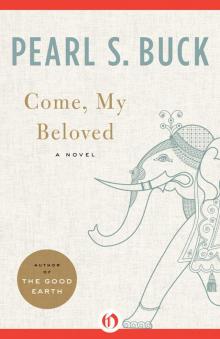 Come, My Beloved
Come, My Beloved The Big Wave
The Big Wave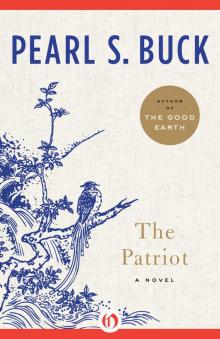 The Patriot
The Patriot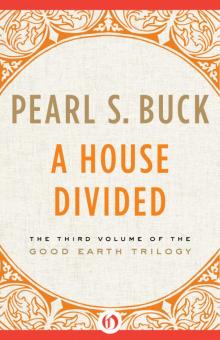 House Divided
House Divided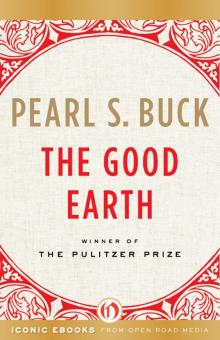 The Good Earth
The Good Earth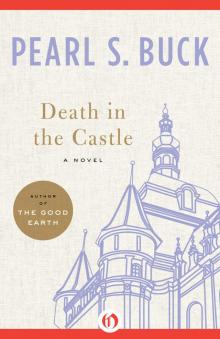 Death in the Castle
Death in the Castle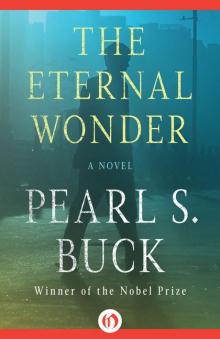 The Eternal Wonder
The Eternal Wonder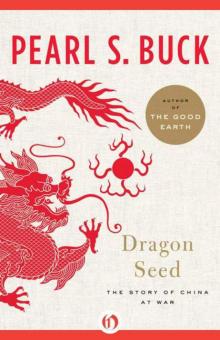 Dragon Seed: The Story of China at War
Dragon Seed: The Story of China at War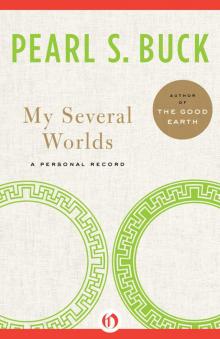 My Several Worlds: A Personal Record
My Several Worlds: A Personal Record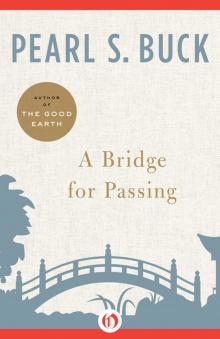 A Bridge for Passing: A Meditation on Love, Loss, and Faith
A Bridge for Passing: A Meditation on Love, Loss, and Faith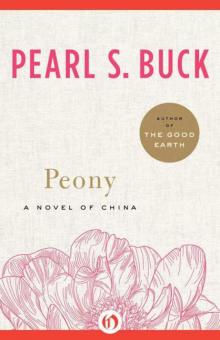 Peony
Peony East Wind: West Wind: The Saga of a Chinese Family
East Wind: West Wind: The Saga of a Chinese Family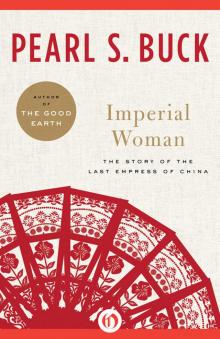 Imperial Woman
Imperial Woman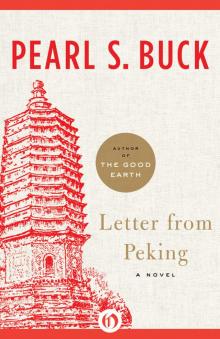 Letters From Peking
Letters From Peking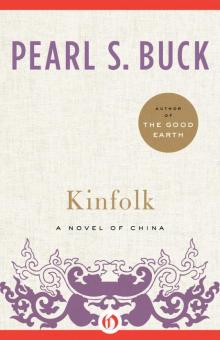 Kinfolk
Kinfolk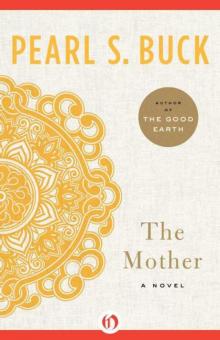 The Mother
The Mother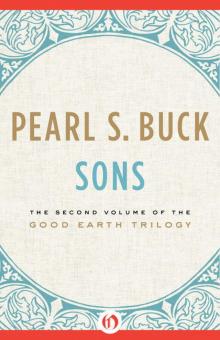 Sons
Sons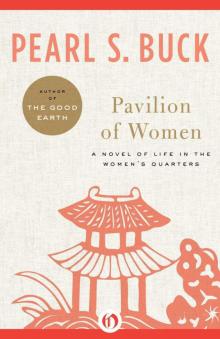 Pavilion of Women
Pavilion of Women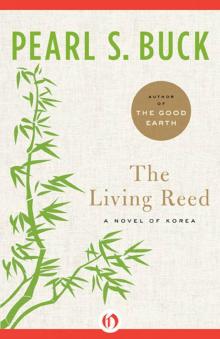 The Living Reed: A Novel of Korea
The Living Reed: A Novel of Korea The Big Wave: A Novel
The Big Wave: A Novel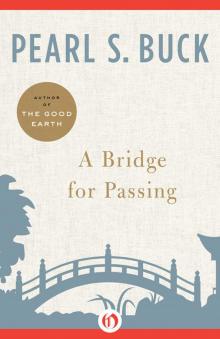 Bridge for Passing
Bridge for Passing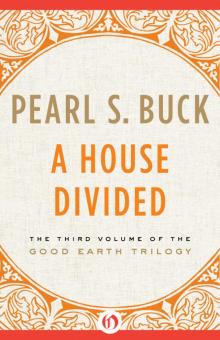 A House Divided
A House Divided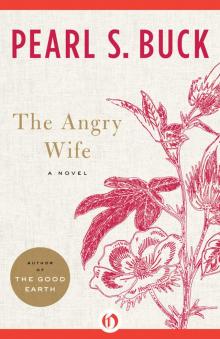 Angry Wife
Angry Wife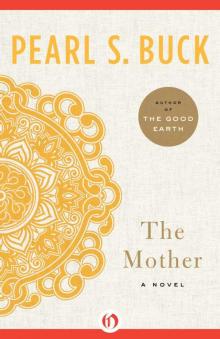 The Mother: A Novel
The Mother: A Novel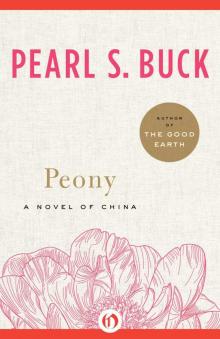 Peony: A Novel of China
Peony: A Novel of China East Wind: West Wind
East Wind: West Wind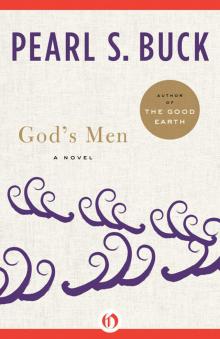 Gods Men
Gods Men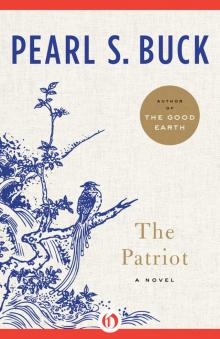 Patriot
Patriot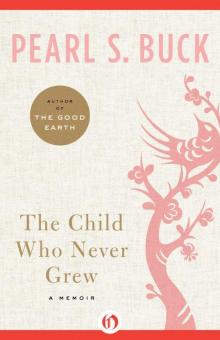 The Child Who Never Grew (nonfiction)
The Child Who Never Grew (nonfiction)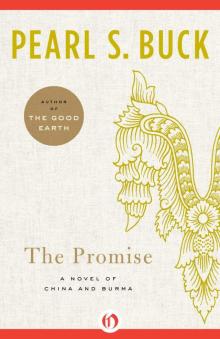 The Promise: A Novel of China and Burma (Oriental Novels of Pearl S. Buck)
The Promise: A Novel of China and Burma (Oriental Novels of Pearl S. Buck)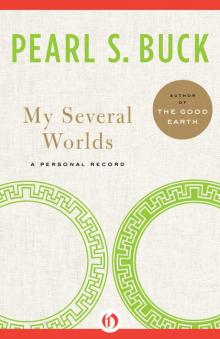 My Several Worlds
My Several Worlds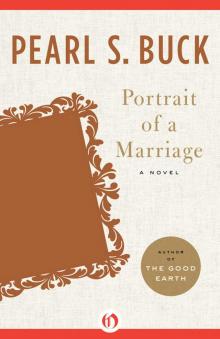 Portrait of a Marriage
Portrait of a Marriage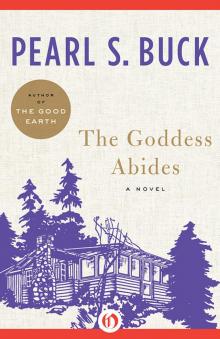 The Goddess Abides: A Novel
The Goddess Abides: A Novel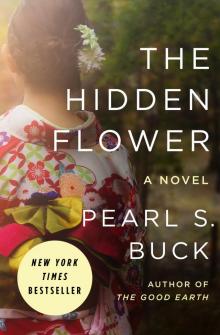 Hidden Flower
Hidden Flower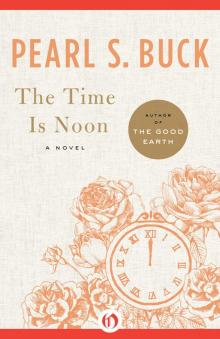 Time Is Noon
Time Is Noon